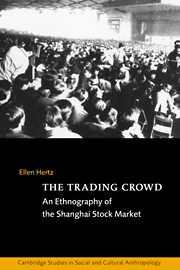Book contents
- Frontmatter
- Contents
- List of illustrations
- Preface
- Acknowledgments
- List of abbreviations
- Conversion rate
- Introduction: Ways and means
- Part I
- Part II
- 5 The big players (dahu)
- 6 The dispersed players (sanhu)
- 7 Guojia: The rise and fall of a super-player
- 8 Conclusion: The trading crowd
- 9 Afterwords
- Glossary of Chinese terms
- Bibliography
- Index
- More titles in the Cambridge Studies in Social and Cultural Anthropology series
6 - The dispersed players (sanhu)
Published online by Cambridge University Press: 05 June 2012
- Frontmatter
- Contents
- List of illustrations
- Preface
- Acknowledgments
- List of abbreviations
- Conversion rate
- Introduction: Ways and means
- Part I
- Part II
- 5 The big players (dahu)
- 6 The dispersed players (sanhu)
- 7 Guojia: The rise and fall of a super-player
- 8 Conclusion: The trading crowd
- 9 Afterwords
- Glossary of Chinese terms
- Bibliography
- Index
- More titles in the Cambridge Studies in Social and Cultural Anthropology series
Summary
The opposite of a big player is a “small player” (xiaohu) or, in the more commonly employed phrase, a “dispersed player” (sanhu). The category of sanhu includes all those investors, the overwhelming majority, who do not own shares in quantities sufficient to qualify as dahu, and thus cuts across the entire spectrum of class/status distinctions within urban Chinese society. As opposed to dahu, sanhu are not represented by a social stereotype; indeed, the notion of sanhu is not really applicable outside the stock market (and perhaps a few other speculative markets such as the postage stamp market discussed in chapter 5). However, sanhu are to the stock market what “the People,” “the public,” “the masses” or even “the market” are to other spheres of urban Chinese life. By examining sanhu we are thus indirectly examining the structure and dynamics of these larger, more historically charged categories of Shanghai social history.
The “san” in sanhu literally means loose, scattered, random or unorganized. The word features in a famous and troubling aphorism in which Sun Yat-sen described “the Chinese people” as “a sheet of loose sand” (“yi plan son sha”). It is worth lingering for a moment over this appellation, for it suggests that a “small” investor is not merely small; he or she lacks coherence, togetherness, a group. If the dahu is stereotypically a lone hero/anti-hero – the cowboy of the Shanghai stock market – the sanhu is a crowd manqué.
- Type
- Chapter
- Information
- The Trading CrowdAn Ethnography of the Shanghai Stock Market, pp. 152 - 173Publisher: Cambridge University PressPrint publication year: 1998

